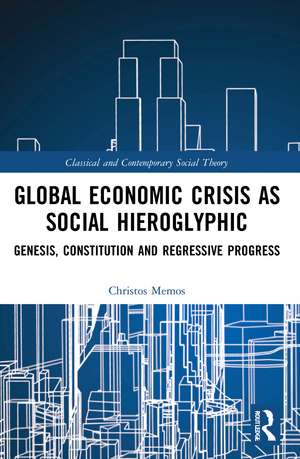Global Economic Crisis as Social Hieroglyphic: Genesis, Constitution and Regressive Progress: Classical and Contemporary Social Theory
Autor Christos Memosen Limba Engleză Paperback – 9 ian 2023
| Toate formatele și edițiile | Preț | Express |
|---|---|---|
| Paperback (1) | 364.94 lei 6-8 săpt. | |
| Taylor & Francis – 9 ian 2023 | 364.94 lei 6-8 săpt. | |
| Hardback (1) | 764.20 lei 6-8 săpt. | |
| Taylor & Francis – 15 apr 2021 | 764.20 lei 6-8 săpt. |
Din seria Classical and Contemporary Social Theory
-
 Preț: 310.12 lei
Preț: 310.12 lei -
 Preț: 281.98 lei
Preț: 281.98 lei -
 Preț: 155.43 lei
Preț: 155.43 lei -
 Preț: 309.20 lei
Preț: 309.20 lei -
 Preț: 326.49 lei
Preț: 326.49 lei -
 Preț: 287.82 lei
Preț: 287.82 lei -
 Preț: 363.67 lei
Preț: 363.67 lei -
 Preț: 317.81 lei
Preț: 317.81 lei -
 Preț: 202.64 lei
Preț: 202.64 lei -
 Preț: 324.87 lei
Preț: 324.87 lei -
 Preț: 311.41 lei
Preț: 311.41 lei -
 Preț: 449.41 lei
Preț: 449.41 lei - 26%
 Preț: 765.77 lei
Preț: 765.77 lei - 26%
 Preț: 763.39 lei
Preț: 763.39 lei - 13%
 Preț: 338.33 lei
Preț: 338.33 lei - 18%
 Preț: 1002.18 lei
Preț: 1002.18 lei -
 Preț: 489.26 lei
Preț: 489.26 lei -
 Preț: 489.26 lei
Preț: 489.26 lei - 9%
 Preț: 934.94 lei
Preț: 934.94 lei -
 Preț: 469.34 lei
Preț: 469.34 lei - 18%
 Preț: 1003.43 lei
Preț: 1003.43 lei -
 Preț: 481.20 lei
Preț: 481.20 lei - 12%
 Preț: 325.34 lei
Preț: 325.34 lei - 18%
 Preț: 1008.97 lei
Preț: 1008.97 lei - 18%
 Preț: 998.71 lei
Preț: 998.71 lei -
 Preț: 469.34 lei
Preț: 469.34 lei - 26%
 Preț: 816.44 lei
Preț: 816.44 lei - 26%
 Preț: 821.13 lei
Preț: 821.13 lei - 18%
 Preț: 1001.07 lei
Preț: 1001.07 lei - 18%
 Preț: 1000.45 lei
Preț: 1000.45 lei - 18%
 Preț: 1005.31 lei
Preț: 1005.31 lei - 18%
 Preț: 1000.27 lei
Preț: 1000.27 lei -
 Preț: 381.51 lei
Preț: 381.51 lei -
 Preț: 469.34 lei
Preț: 469.34 lei - 18%
 Preț: 836.89 lei
Preț: 836.89 lei -
 Preț: 469.34 lei
Preț: 469.34 lei - 26%
 Preț: 763.13 lei
Preț: 763.13 lei - 28%
 Preț: 821.53 lei
Preț: 821.53 lei - 18%
 Preț: 1115.84 lei
Preț: 1115.84 lei - 18%
 Preț: 1003.12 lei
Preț: 1003.12 lei
Preț: 364.94 lei
Nou
Puncte Express: 547
Preț estimativ în valută:
69.83€ • 73.06$ • 58.01£
69.83€ • 73.06$ • 58.01£
Carte tipărită la comandă
Livrare economică 02-16 aprilie
Preluare comenzi: 021 569.72.76
Specificații
ISBN-13: 9780367754648
ISBN-10: 0367754649
Pagini: 182
Dimensiuni: 156 x 234 mm
Greutate: 0.34 kg
Ediția:1
Editura: Taylor & Francis
Colecția Routledge
Seria Classical and Contemporary Social Theory
Locul publicării:Oxford, United Kingdom
ISBN-10: 0367754649
Pagini: 182
Dimensiuni: 156 x 234 mm
Greutate: 0.34 kg
Ediția:1
Editura: Taylor & Francis
Colecția Routledge
Seria Classical and Contemporary Social Theory
Locul publicării:Oxford, United Kingdom
Public țintă
Postgraduate and UndergraduateCuprins
Introduction 1. Capitalism in permanent crisis, 1920s–1930s 2. Political crisis and the crisis of modernity: Eastern Europe (1953–1968) 3. The crisis of Keynesianism, the transformation of liberal oligarchies and the critique of politics 4. The crisis of critique, the eclipse of subversive reason and the question of social constitution 5. The crisis and metamorphoses of the bourgeois individual: On negative anthropology 6. Capitalism as social regression: Destructive tendencies and new forms of barbarism 7. The 2008 economic crisis as an alienated critique of capitalism
Notă biografică
Christos Memos is Lecturer in Social and Political Theory at the Abertay University, UK. He is the author of Castoriadis and Critical Theory: Crisis, Critique and Radical Alternatives (2014).
Recenzii
‘This is an original, important and challenging contribution to our understanding of the global economic crisis that continues to shape our lives … Christos Memos provides an all-encompassing account of the 2008 crisis that reveals the ontological and epistemological foundations of our existing social order, and the superficiality of both bourgeois and orthodox Marxist accounts.’ – Hugo Radice, Capital & Class
Descriere
This book examines the 2008 global economic crisis as a complex social phenomenon or "social hieroglyphic", arguing that the crisis is not fundamentally economic, but instead a symptom of a long-standing, multifaceted, and endemic crisis of capitalism which has effectively become permanent.
